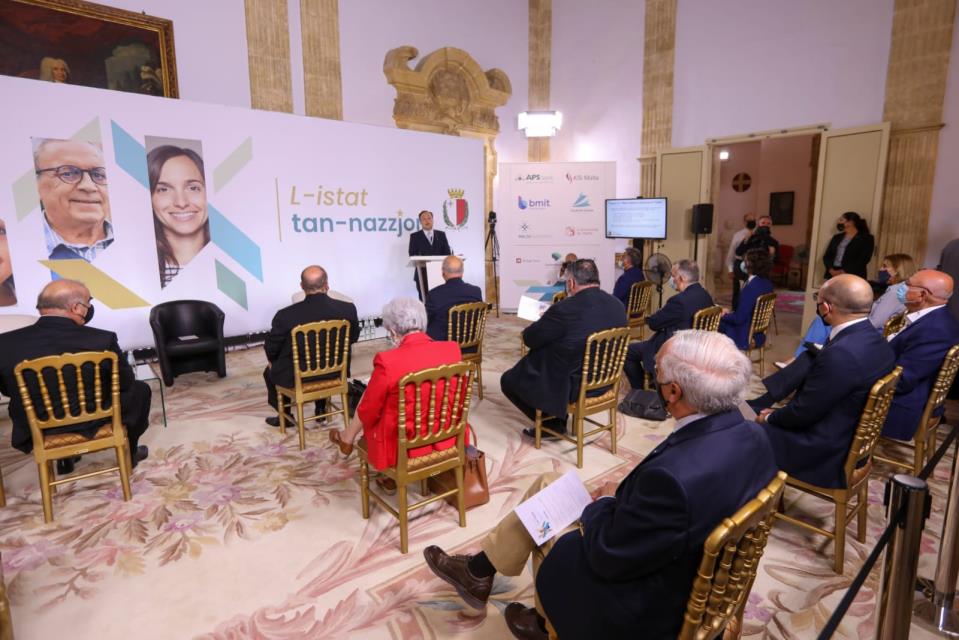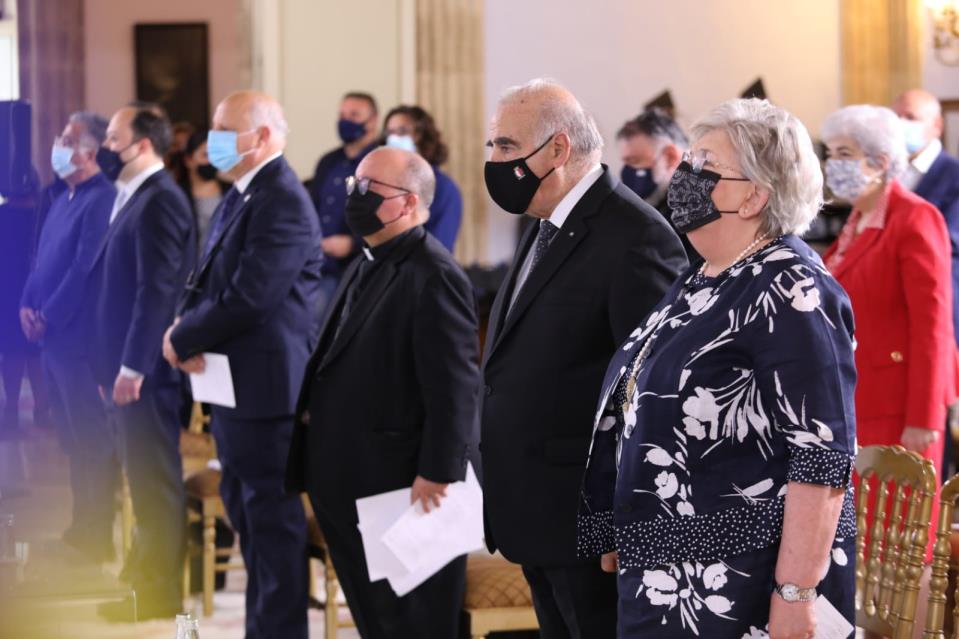Sixty per cent of the Maltese population say they are happy with their lives, while only 17.3% of people sometimes voted for different parties, a survey carried out shows.
The overwhelming majority of Maltese (92.7%) think that events taking place overseas are affecting us much more than what happened a decade ago.
The majority of the Maltese do not feel comfortable mixing cultures in our society, with 28.6% saying that they are not comfortable at all (1), 21% not comfortable (2), and 40.9% so and so (3).
The survey was presented by statistician Vince Marmara at the start of a conference organised by the Office of the President on the state of the nation.
The principal aims of the survey was to analyse the state of Maltese citizens, who they are, what people believe and their principles.
Some of the aspects that are analysed are religion, culture, employment, daily choices, rights, politics, and financial aspects, amongst other things.
This took into consideration 1,064 persons from 16 years and over, with a margin of error of +/-3%
The first section took into consideration daily choices. Over 70% of survey respondents say they plan their lives (71.0%), while 29.0% of survey respondents say they live their lives day by day. Men plan their lives more than women (77.5% - men vs. 64.1% - women). Widows are the ones who live their lives day by day the most (90.5%). Those over the age of 66 are the least likely to plan their lives (28.5%).
People who have a higher level of education than secondary school are the ones who plan their lives the most. All the students who responded to this survey said they plan their lives. The more people pay income tax, the more they are said to plan their lives. Those living south of the Grand Harbor mostly live their lives day in and day out.
In terms of life satisfaction, more than 60% of survey respondents said they were happy with their lives (60.7%). Approximately 40 percent (39.2%) said that their lives could be better. Only 0.1% of respondents said they were not happy with their lives.
The overwhelming majority of those who ended their marriage said their lives could be better (94.3%). Young people aged between 16 and 25 are the happiest with their lives (76.0%). The people who responded to this survey and who have the lowest level of education are the most likely to say that their lives could be better (48.1%).
The people who responded to this survey and live in the west of the country are the most happy with their lives, Marmara (below) said.

Regarding success in life, more than 60% of survey respondents said they feel successful in their lives (61.1%). Close to 40 percent (38.4%) said they could have been more successful. Those who are not married are the most likely to think they have succeeded in their lives (69.2%).
Young people aged 16-25 are the cohort that believe the most that they have been successful in their lives (83.3%). The people who responded to this survey and who have the lowest level of education are the most likely to say they could have been more successful in their lives (51.0%).
In terms of where people search for help the most, help from relatives living with them was the highest (71.4% of respondents said they discuss their problems with the family they live with, 23.5% responded ‘almost always’).
As for the rest of the people: Family not living with them (1.1% always and 23.7% almost always); Church (members of the clergy) (5.0% always and 15.8% almost always); Friends, Professionals such as counsellors, psychologists, and social workers, and work colleagues, were least sought for help. The least to seek help from is from work colleagues (65.7% of respondents said they do not seek help regarding their problems from work colleagues).

In terms of decision-making, the family is the most sought-after source (82.6%). In addition, the second most popular choice was that most important decisions are not discussed with anyone and the person makes the decision on their own (56.7%). The least popular way to make decisions is: depending on what society thinks of me (0.5%).
Men make more decisions on their own than women (65.0% - men vs 47.7% - women). Those aged between 16 and 25 are the most important decision-makers alone (87.3%). Spouses are mostly decision-making together with family members (94.4%). The people who took part in this survey mentioned family/marriage and career as the two most important choices they made.
The majority of people said they do not know if they will be living a better life within a year (62.5%). Around 30% of survey respondents said they thought they would be living a better life within a year (30.4%). Only 7.1% of people said they would not be living a better life within a year.

A third of spouses said they think they will be living a better life within a year. Those aged between 16 and 25 are mostly unaware of whether they will be living a better life within a year (70.1%).
More than 60% of survey respondents said that their rights are being properly protected (62.4%). Only 2.1% of people said their rights are not being protected, while 35.3% of people said their rights are being better protected. Women mostly feel that their rights can be better protected (39.7% - women vs 31.1% - men).
Almost three quarters of those who ended their marriage think their rights can be better protected.
More than three-quarters of survey respondents said their standard of living equals the average (75.8%). About a fifth of people said their standard of living is above average (19.2%). Only five percent of people said their standard of living is below average. Those who have ended their marriage were the most which said that their standard of living is below average (21.4%). The higher people's level of education, the more they say they have their living standards above average.
The majority of people said that their financial situation remained the same when compared to a year ago (62.4%). Close to a quarter of people said their financial situation improved this year (24.2%). For 13.5% of respondents, their financial situation deteriorated.
The people who replied to this survey were asked to rank the following (most important '1' and least important '5'): Income from your employment (average: 2.17); Job satisfaction (average: 2.24); Job security/guarantee (average: 2.69); Flexibility of hours (average: 3.71); Appreciation at work (average: 4.19).
In terms of religion, the overwhelming majority of survey respondents said they believed in God (93.5%). Only 3.0% said they did not believe in God, while 3.5% of people said they did not know. 8% of 16- to 25-year-olds said they do not believe in God.
Almost 60% of survey respondents said that religion is very important in their lives (59.6%). For about 30% of people, religion is not so important in their lives (29.4%), while for more than 10% religion is not important at all in their lives (10.8%).
Women consider religion more important than men (67.7% women vs 51.9% men). The older the age, the more important religion is in human life. The people who responded to this survey and have the lowest level of education are the most likely to say that religion is important in their lives (73.1%).
More than 50% of survey respondents said they consider religion a lot when making decisions about what is right or wrong (53.9%). A third of people do not consider religion so much when making decisions about what is right or wrong (33.3%), while 12.5% of people do not consider religion at all.
The older the age, the more people consider religion when making decisions about what is right or wrong. The people who responded to this survey and who have the lowest level of education are mostly considering religion when making decisions about what is right or wrong (73.1%).
More than 50% of survey respondents said they feel they belong to the whole of Malta (54.3%). Just over a third of people feel they belong to the village or city where they live (34.5%), while 11.2% of people consider themselves part of Europe as a whole.
Widows are mostly regarded as inhabitants of the village or town where they reside (81.0%). The older the age of the people, the more they regard themselves as inhabitants of the village or city where they live. People with a level of tertiary education are most likely to consider themselves part of Europe (15.6%).
The majority of Maltese who replied to this survey said that they would not wish to have been born elsewhere (87.1%). Widows are the most likely to say they would like to have been born else (14.3%). Almost all Gozitans said they would not have wished to be born elsewhere (97.2%).
Politics
When it comes to politics, for almost half of the people who responded to this survey, Maltese politics is very important in their lives (48.3%). More than a third of people said that Maltese politics is not so important in their lives (37.3%), while for 12.9% of people, Maltese politics has no importance in their lives.
Men attach more importance to Maltese politics than women give (52.0% men vs 44.4% women). The older the age of people, the more importance Maltese politics attaches to their lives. Those with the lowest level of education are the cohort that considered Maltese politics very important in their lives (59.6%).
Almost half of the students who took part in this survey said that they attach no importance to Maltese politics in their lives (48.4%). The Gozitans are the least likely to say that they attach a lot of importance to Maltese politics in their lives.
More than 40% of people said they would get their opinion on several different topics depending on the opinion of the political party they believe in (43.9%). More than 50% of men come to their opinion on various different topics depending on the opinion of the political party they believe in (50.4%), while women stood at 37.1%.
People with a high level of education are the least likely to get their opinion on several different topics, depending on the opinion of the political party they believe in, with 36.4%.
In the past, most Maltese have always voted for the same party (82.7%). Only 17.3% of people sometimes voted for different parties. People with a high level of education are the most likely to have voted for a different party. 21% of them said they sometimes voted for a different party.
In the future, more than half of Maltese would not consider voting for another party (55.8%). Just over a quarter of people consider voting for a different party in the future (27.3%).
Young people aged 16-25 are most likely to consider voting for a different party in the future (50.3%). The higher the level of education of people, the more likely they are to vote for a different party in the future.
The higher the people's income tax, the more likely they are to vote for a different party in the future. People living in the north of Malta are most willing to vote a different party in the future (45.2%).
The use of social media is affecting a lot of how news is announced. The most popular medium with the Maltese to follow the news is links to news portals on Facebook (72.4%). Television is still a popular news channel, as it is the second most widely used media source by the Maltese to follow the news. It is worth noting how much the popularity of the print newspaper has decreased.
The overwhelming majority of Maltese (92.7%) think that events taking place overseas are affecting us much more than what happened a decade ago.
Maltese do not feel comfortable mixing cultures in our society, with 28.6% saying that they are not comfortable at all (1), 21% not comfortable (2), and 40.9% so and so (3).
The event will conclude with speeches by President George Vella, Prime Minister Robert Abela and Opposition Leader Bernard Grech. The event is being moderated by media consultant Lou Bondi.